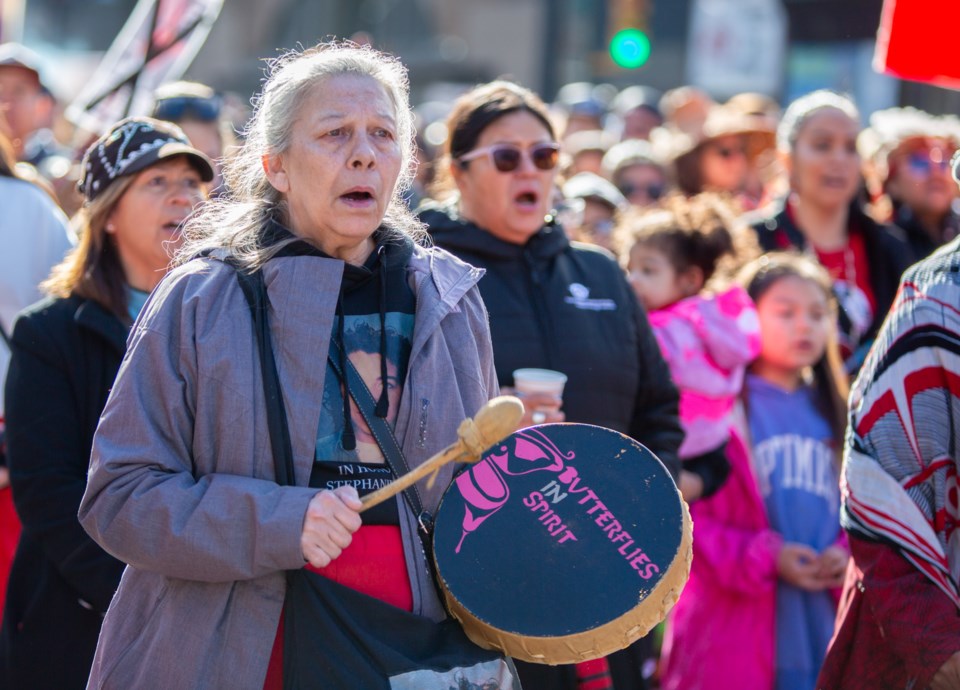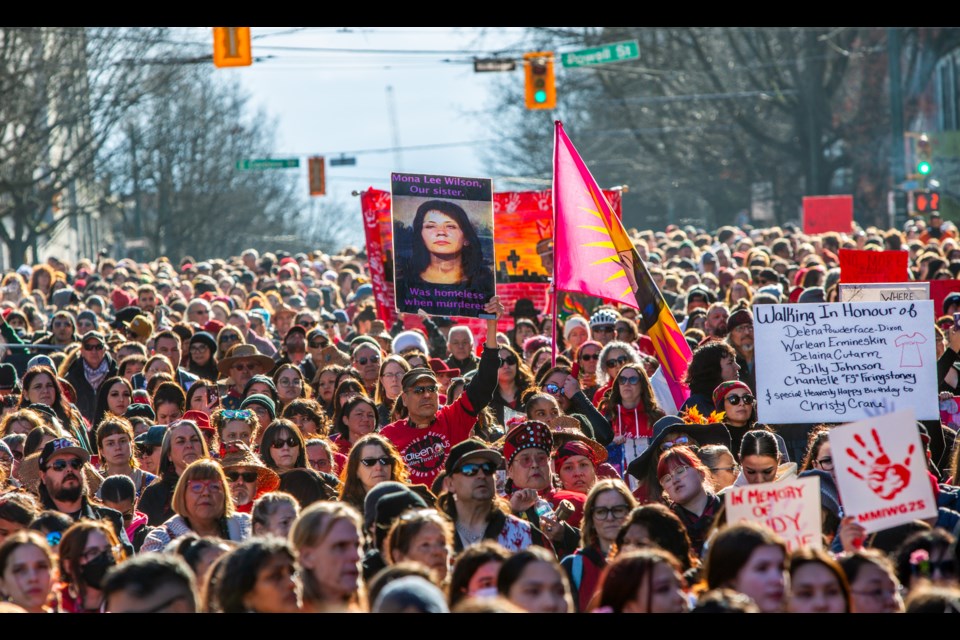Several thousand people — some beating drums, some singing and others carrying large photographs of deceased relatives and friends — turned the Downtown Eastside into a walking memorial Wednesday for girls and women.
The 33rd annual Women’s Memorial March attracted Indigenous leaders, social workers, activists, politicians and police officers who walked in memory of girls and women who lost their lives to violence, poverty and illness.
Michele Pineault, wearing a T-shirt emblazoned with a photograph of her daughter Stephanie Lane, was among the marchers. Lane’s DNA was discovered on the Port Coquitlam farm belonging to serial killer, Robert Pickton.
“You come down here with grief and your heart is so full of love by the end of it,” said Pineault, moments before the march began at Main and Hastings streets. “It's just an incredible feeling. I will sleep good tonight.”
At the same time, Pineault said she never wanted to be part of “club” of grieving parents and relatives, who have lost daughters to violence.
She avoided the march for the past three years, saying it continues to be difficult to cope with the loss of her 20-year-old daughter.
Lane went missing in January 1997. Six years later, her DNA was discovered on Pickton’s farm.
“We didn’t know where she was for all those years,” she said, before joining the marchers in song while she beat on a hand-held drum.

Rose petals
Marchers stopped at several locations along the procession route where girls and women were last seen before they went missing, or died. Elders said prayers, left roses and medicines.
The procession was led by two young Indigenous girls, who dropped rose petals as they walked down Main Street, through parts of Gastown and back along East Hastings Street.
The first march was organized by women in 1992 to honour the memory of an Indigenous woman who was murdered in Vancouver. The woman's grieving mother joined others to make the march an annual grassroots event in the Downtown Eastside.
'Cycle of violence must end'
Premier David Eby issued a statement before the march that he directed at the families and friends who have lost loved ones.
"The pervasiveness of violence against women must be addressed and the cycle of violence must end,” Eby said.
“Our government has taken important steps to support survivors, including increasing access to sexual assault services and expanding the supply of safe, short-term housing for women and children leaving violence.”
The premier said his government is working to provide opportunities “that everyone needs to build a good life,” with housing on and off reserve, access to child care and breaking down barriers to skills training by making it more affordable.
"We know there is much more work to be done,” he said. “We are committed to listening, taking action, and working with Indigenous women and others.”
Glacier Media reported in April 2023 that Indigenous girls under 18 years old were the most overrepresented victims of violence in �鶹��ýӳ��over a 12-month period, according to data compiled by the �鶹��ýӳ��Police Department.
The next two groups of victims based on gender, age and ethnicity were Indigenous women aged 35 to 64 followed by Indigenous women aged 65 and older.
The findings were based on a review of 6,158 victims of violent crimes between April 2022 and March 2023. Assaults, sexual assaults, robberies and homicides were included in determining an “odds ratio score” for victims.
'Life safer for all people'
Joan Philip, the NDP MLA for Vancouver-Mount Pleasant, attended the march with her husband, Grand Chief Stewart Philip, and Terry Teegee, the elected Regional Chief of the British Columbia Assembly of First Nations.
"To the people who continue to raise awareness, demand justice and seek to make life safer for all people, we extend our gratitude,” Philip said in a statement. “No woman, girl or 2SLGBTQIA+ person should ever experience violence or feel unsafe.”
Added Philip: "As government, we have a role and a responsibility to lift up the voices of all those who call for an end to gender-based violence, and to dismantle systemic racism and discrimination that are all too often a root cause of violence. We share the anguish, the frustration and the determination to make our province safe for everyone."




